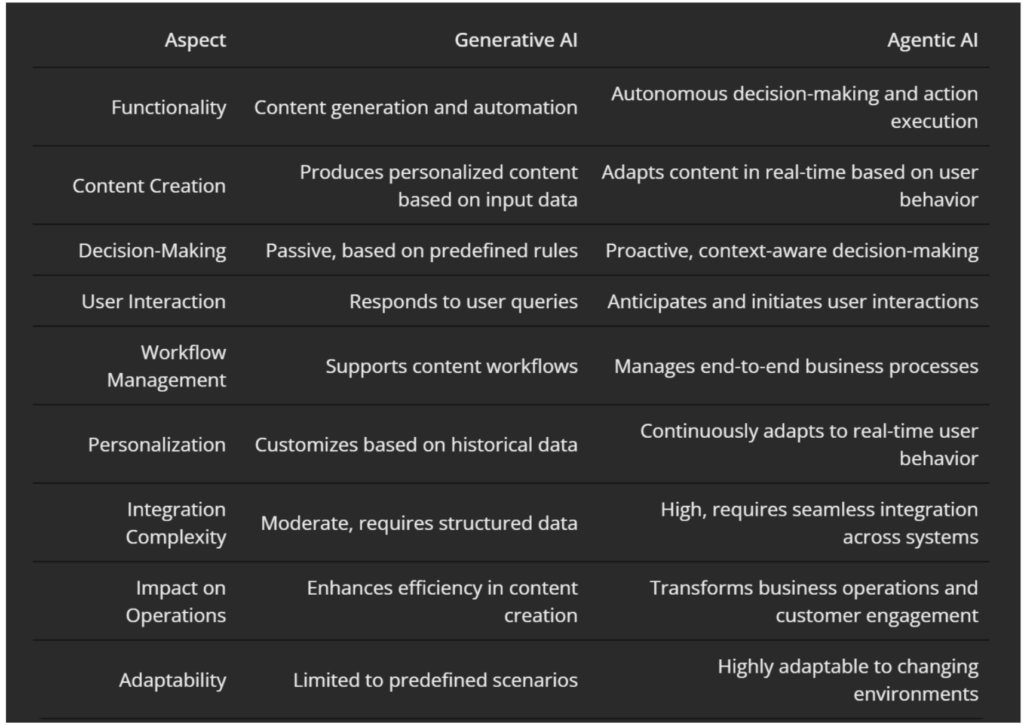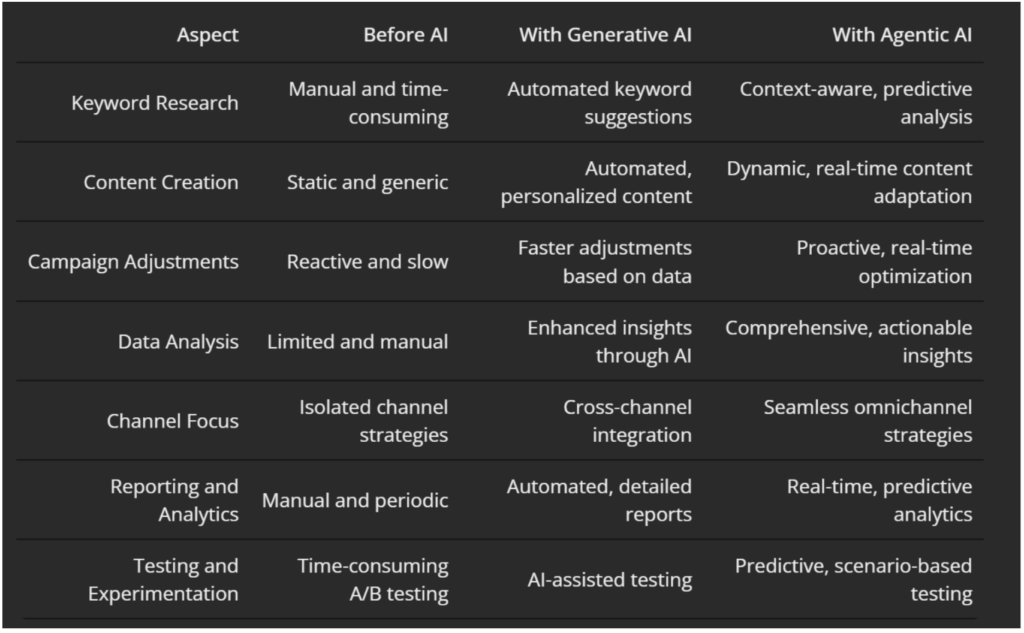The Future of Product Discovery: How AI is Revolutionizing Online Shopping
The way consumers find and purchase products online has transformed dramatically in recent years, with artificial intelligence (AI) at the heart of this evolution. By enhancing digital marketplaces through advanced search capabilities and autonomous decision-making, AI is reshaping how shoppers interact with e-commerce platforms. Beyond traditional search methods, agentic AI introduces self-optimizing systems that refine product recommendations, personalize search results, and even anticipate customer needs before they are explicitly expressed. This innovation is not only improving the shopping experience but also driving significant business growth.
For marketing teams and e-commerce leaders, understanding the impact of AI-powered search and agentic AI is essential. These technologies are boosting product discoverability, increasing conversion rates, and helping businesses stay competitive in an ever-evolving digital landscape. As AI continues to evolve, it is redefining how customers search for and purchase products, setting a new standard for relevance and personalization.
The New Era of AI-Driven Product Discovery
The rise of AI-driven search platforms marks a radical shift in how customers shop online. Traditional keyword-based search engines often deliver incomplete or irrelevant results, leaving shoppers frustrated and unable to find what they need. In contrast, AI-powered search engines leverage cutting-edge technologies like machine learning, natural language processing (NLP), and visual recognition to understand user intent and context.
This transformation means that consumers now expect hyper-relevant and personalized search experiences. Whether they type a query, speak to a voice assistant, or upload an image to find a specific product, AI ensures that the results align with their preferences and needs. For businesses, this shift translates into improved visibility, higher engagement, and increased sales. Shoppers are more likely to complete a purchase when they can quickly and easily find exactly what they’re looking for, making AI-powered search a critical tool for success in modern e-commerce.
As AI-driven product discovery becomes the norm, businesses must adapt to meet these heightened consumer expectations. By integrating advanced search technologies and agentic intelligence into their platforms, companies can provide seamless, intuitive shopping experiences that keep customers coming back.
How AI Search is Transforming E-Commerce Businesses and Driving Growth
For e-commerce businesses, the evolution of AI-powered search represents both an opportunity and a challenge. On one hand, this technology significantly enhances product discoverability, enabling brands to connect with the right customers more effectively. Retailers leveraging AI-driven search have reported conversion rate increases of up to 30%, thanks to improved search relevance and precision.
On the other hand, succeeding in this AI-driven landscape requires businesses to adapt. This includes optimizing product listings for semantic search, refining content to align with AI algorithms, and leveraging data-driven insights to stay competitive. While these adjustments may seem daunting, the potential for growth and success makes embracing AI an optimistic and strategic move for the future.
As AI search continues to reshape online shopping, businesses that adopt these advancements will be better positioned to boost sales, enhance customer engagement, and build long-term loyalty. The key lies in understanding how AI search benefits e-commerce and implementing the necessary tools to stay ahead of the curve.
The Benefits of AI Search for E-Commerce Businesses
AI-powered search offers numerous advantages that directly impact business performance. For starters, it drives higher engagement by providing personalized and intuitive search experiences. Dynamic product recommendations keep customers on-site longer, increasing the likelihood of a purchase.
Additionally, AI search improves conversion rates by helping customers find exactly what they’re looking for through enhanced filters, category suggestions, and auto-complete functions. By delivering precise results instantly, it also reduces bounce rates, creating a smoother and more enjoyable shopping experience.
Mobile shoppers benefit as well, thanks to AI’s ability to optimize voice search, streamline navigation, and offer location-based personalization. These features ensure that mobile users enjoy a seamless experience, which is critical in today’s smartphone-dominated world.
Perhaps most importantly, AI search fosters customer retention. By learning from user interactions, it refines future search results and recommendations, encouraging repeat purchases and building brand loyalty.
Action Step: Is Your Business Ready for AI-Powered Search?
To remain competitive, it’s essential to evaluate your current search function. Are you relying on outdated keyword-matching systems, or are you harnessing the power of AI-driven search technology? Testing AI-powered tools can provide valuable insights into their impact on engagement, conversions, and overall customer satisfaction.
By auditing and upgrading your search capabilities, you can unlock the full potential of AI to drive growth and success for your e-commerce business.
What is Agentic AI and Why Does It Matter for Businesses?
The evolution from generative AI to agentic AI represents a groundbreaking shift in how businesses utilize artificial intelligence to engage with customers and streamline operations. While generative AI has already transformed content creation by automating product descriptions, chat responses, and personalized recommendations, agentic AI takes this innovation to the next level. It introduces autonomy, decision-making capabilities, and the ability to execute actions, making it a game-changer for industries like e-commerce, where speed, personalization, and efficiency are essential to success.
Unlike generative AI, which passively creates outputs based on input data, agentic AI actively manages end-to-end workflows, optimizes customer interactions, and makes real-time strategic decisions. This leap in functionality allows businesses to automate complex processes, deliver hyper-personalized experiences, and respond to customer needs faster than ever before.
Imagine having an “AI Sommelier” that not only understands your customers’ preferences but also leverages artificial intelligence to provide tailored wine recommendations and expert pairing advice. This AI could interact with customers by asking what they’re cooking for dinner or what ingredients they have on hand. Drawing from its extensive knowledge of wine characteristics, it could suggest the perfect wine to complement their meal. Beyond simplifying the selection process, this AI sommelier could introduce customers to new products they might love, enhancing their shopping experience while driving sales.
This example highlights how agentic AI empowers businesses to achieve higher efficiency, boost customer engagement, and implement scalable automation. By combining advanced decision-making with actionable insights, agentic AI is redefining what’s possible in customer service, operational optimization, and overall business growth.
For companies looking to stay competitive in an increasingly digital marketplace, understanding and adopting agentic AI is no longer optional—it’s essential. The ability to anticipate customer needs, automate workflows, and deliver personalized experiences at scale can set businesses apart in a crowded e-commerce landscape.

The Impact of Agentic AI on E-Commerce: Transforming Business Operations and Customer Experiences
Agentic AI is revolutionizing the e-commerce landscape by optimizing business operations through intelligent automation. This advanced technology enhances product discovery and search functionality by deeply understanding customer intent and context, delivering faster and more accurate results. By analyzing real-time market trends, competitor pricing, and shifts in consumer demand, agentic AI effectively manages inventory levels and dynamic pricing strategies. It ensures seamless integration across platforms with the help of ontologies and semantic layers, creating a unified shopping experience for customers.
According to McKinsey, businesses leveraging AI-driven automation can reduce operational costs by up to 30% while boosting revenue by 10-15% through smarter decision-making and personalized recommendations. This level of efficiency not only benefits businesses but also enhances the overall customer journey, making it smoother and more intuitive.
Elevating Personalization with Agentic AI
In the realm of personalization, agentic AI surpasses traditional models by continuously analyzing user behavior to deliver tailored recommendations, promotions, and content. By leveraging actions, preferences, and historical data, agentic AI creates hyper-personalized interactions that resonate with customers. It builds trust through explainable AI, offering transparency in how decisions are made and ensuring customers feel confident in their interactions.
A study by Accenture highlights that businesses utilizing advanced AI personalization see a 40% increase in customer engagement and a 20% boost in conversion rates. These numbers underscore the transformative potential of agentic AI in driving measurable business outcomes.
Proactive Customer Engagement and Omnichannel Experiences
Agentic AI takes customer engagement to the next level by anticipating needs and delivering proactive solutions. For example, it can notify customers about new product launches or exclusive offers based on their shopping habits. This predictive approach not only enhances repeat purchases but also strengthens brand loyalty by fostering deeper connections with shoppers.
Moreover, agentic AI ensures contextual awareness across multiple channels, from websites to mobile apps to social media. This omnichannel capability creates a cohesive shopping experience, allowing customers to transition seamlessly between platforms while maintaining consistency in their interactions.
Boosting Online Presence with Advanced Strategies
To stay competitive, businesses are increasingly leveraging mobile apps for e-commerce and integrating advanced strategies like product reviews and AI-powered chatbots. By staying updated with emerging SEO trends and adopting cutting-edge technologies, companies can position themselves as industry leaders. These innovations not only improve visibility but also enhance customer satisfaction and retention.
How AI Search and Agentic AI Are Reshaping Marketing Teams and SEO Roles
AI-powered search platforms and agentic AI are transforming the roles of marketing teams and SEO professionals, freeing them from time-consuming manual tasks. In the past, marketing teams spent significant effort identifying relevant keywords, crafting detailed content briefs, developing campaign materials, and refreshing existing content to maintain SEO relevance.
Today, intelligent AI systems efficiently handle these repetitive tasks, allowing marketing teams to focus on strategic initiatives and creative projects. AI agents manage data analysis, optimize workflows, and ensure operational efficiency, empowering marketers to make informed decisions and drive innovation.
This shift marks a new era for marketing and SEO professionals, enabling them to concentrate on high-impact activities while AI handles the heavy lifting. The evolution of these roles highlights the growing importance of agentic AI in streamlining processes and maximizing productivity.

The Future of AI in E-Commerce: Enhancing Efficiency and Customer Experiences
The integration of artificial intelligence (AI) into e-commerce is transforming the way businesses operate, offering improved efficiency and empowering marketing teams to deliver personalized, impactful customer experiences. By embracing AI technologies, companies can stay ahead in the competitive digital landscape while driving innovation and growth.
Practical Insights: Implementing AI in E-Commerce
Successfully adopting AI-powered search and agentic AI requires a strategic approach to ensure seamless integration and maximize benefits. Businesses should begin by identifying specific areas where AI can add value, such as enhancing search capabilities, automating customer interactions, or optimizing inventory management. Tools like WordLift can help scale content and boost online presence, aligning AI technologies with business goals for long-term success.
Key Applications of AI in E-Commerce
AI can revolutionize various aspects of e-commerce, directly impacting customer experience and operational efficiency. Here are a few examples:
- Personalized Search Results: AI tailors product recommendations to individual preferences, much like how Spotify curates playlists based on listening habits. This level of personalization enhances user satisfaction and increases the likelihood of conversion.
- Dynamic Pricing: Similar to how Uber adjusts fares based on real-time demand, AI can optimize revenue by offering competitive pricing strategies. This ensures businesses remain agile and responsive to market fluctuations.
- Inventory Management: AI systems predict stock needs and automate reordering processes, akin to Zara’s efficient management of its fast-fashion supply chain. This reduces waste, prevents stockouts, and improves overall supply chain efficiency.
By implementing these AI-driven solutions, companies can enhance their product offerings, improve customer satisfaction, and ultimately drive sales. For instance, businesses leveraging AI-driven personalization have reported over a 30% increase in sales by creating tailored customer journeys and converting casual visitors into loyal customers.
Integration Tips for AI Adoption
When integrating AI-powered search and agentic AI into existing systems, data connectivity and interoperability are crucial. Utilizing ontologies and dynamic knowledge graphs can transform raw data into actionable insights, improving search engine visibility and enabling the creation of engaging, SEO-optimized content.
For example, WordLift’s Knowledge Graph architecture revolutionizes service delivery by turning static data into dynamic, user-focused experiences. This structured approach not only enhances search results but also supports the development of rich, detailed content that resonates with users and boosts engagement.
Overcoming Challenges in AI Implementation
While AI adoption offers immense potential, it is not without challenges. Businesses may face issues related to data privacy, integration complexity, and the need for continuous learning and adaptation. At WordLift, we’ve found that data is the cornerstone of successful AI adoption. Centralizing and enriching data with metadata makes it understandable to AI systems and usable for training models.
This unified and enriched data forms the foundation of a Knowledge Graph, which interconnects all information and makes AI agents smarter. These agents can automate repetitive tasks while adhering to brand guidelines, ensuring consistency and quality across operations.
It’s important to remember that even with agentic AI, humans remain at the core. AI serves as an enhancement to teams, not a replacement. Promoting a culture of learning is essential—educating teams about the value of AI and encouraging them to embrace these intelligent systems fosters excitement and ensures they retain control over strategy.
By addressing these challenges, businesses can ensure that AI adoption is effective, sustainable, and aligned with long-term goals.
The Future of AI in E-Commerce
In conclusion, strategically implementing AI technologies can unlock new opportunities for growth and innovation in e-commerce. With the right approach, AI becomes a powerful tool for enhancing user experience, driving engagement, and optimizing conversion rates. As the AI landscape continues to evolve, businesses that embrace these technologies will be better positioned to thrive in the competitive digital marketplace.
Read also:
Amazon Cancels Certain Inventory Orders from China Amid Tariff Concerns





Leave a Reply